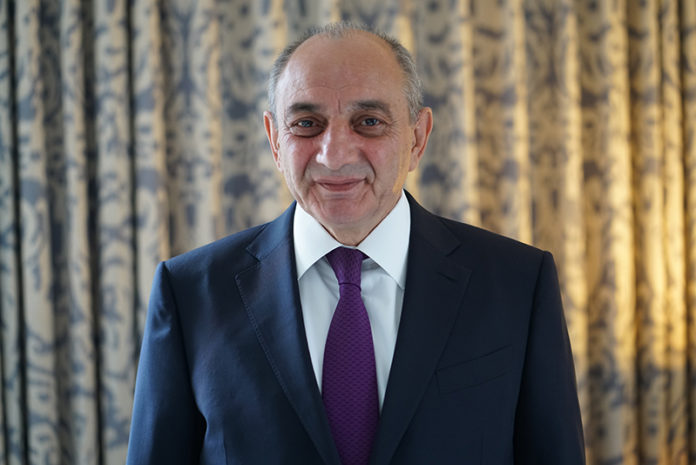WASHINGTON – President Bako Sahakyan of the Republic of Artsakh came to the American capital for his first official visit on March 12 at the head of a governmental delegation for a week of political talks and meetings. When asked what motivated this particular visit, the president responded that Artsakh has enjoyed friendly relations with the United States for many years and he himself has visited the United States on numerous other occasions. However, these trips were primarily connected with the work of the Hayastan All-Armenian Fund. “This time,” he said, “we had the opportunity, and we took advantage of it, to meet with political circles. I am very happy that such meetings took place.” For the first time in history, the Artsakh Republic’s delegation was in the US House of Representatives and worked to deepen the already existing relations with the United States.
President Sahakyan said that although no meetings took place with the US State Department this time, preparations have been made so that hopefully during a future meeting such meetings can occur.
Sahakyan appreciated the ongoing diplomatic efforts of the Organization for Security and Cooperation in Europe (OSCE)’s Minsk Group, of which the United States is a leading member. He said, “We understand that the international community in the person of the Minsk Group is concerned with finding a solution to this complicated issue. However, the Minsk Group’s interest is not sufficient. Our profound conviction is that the non-constructive, extremist, bellicose position of one of the parties, Azerbaijan, toward this issue is the obstruction which we are unable to overcome to achieve more serious agreements.”
He also said that for the peace process to be successful, Artsakh must be one of the full parties or “sides” in negotiations along with Armenia and Azerbaijan, as was initially agreed upon at the 1994 Budapest OSCE summit, and that Artsakh continues to do whatever is in its power to restore that format.
The situation of refugees in the region is often raised in international circles. Sahakyan said, “At present, it is Azerbaijani refugees that are chiefly talked about. We naturally are in favor of talking not only about Azerbaijani refugees but also about Armenian refugees.” Sahakyan declared, concerning Azerbaijanis who used to live in Artsakh and who may wish to regain control of their properties, “We have said on multiple occasions over the course of recent years that Azerbaijani refugees naturally can return to Artsakh, to the Artsakh Republic, if they recognize its jurisdiction.”
He said that while no such applications have occurred so far, “if such applications take place, we will process them in accordance with the delineated norms and laws and present our conclusions and answers.”
When asked to describe the highlights of his achievements as president, Sahakyan modestly answered, “I cannot say that I am satisfied with the work that we did [in recent years], because there is always the necessity of doing more than what you do,” and stressed that it is up to the populace to evaluate the activities of its governmental representative.










